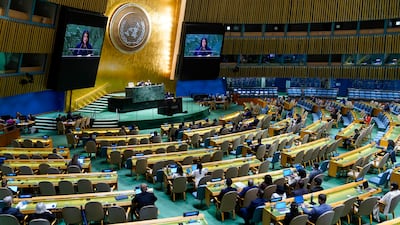Henry Kissinger, the centenarian former US diplomat and Nobel laureate, once observed “the reason that university politics is so vicious is because the stakes are so small”. International politics, where the stakes are not only huge but potentially nuclear, is a domain better suited to civility and compromise.
These days, however, it seems like the world needs reminding of that fact. The need for climate action and concerted efforts to tackle global challenges from pandemics to extremism is greater than ever. And major conflicts continue to pose challenges to the world. The war in Ukraine, for instance, recently hit the 18-month mark with no political settlement in sight. It becomes even harder to reach compromise when the world’s two leading superpowers, the US and China, can hardly stand to be in a room together. And the dramatic breakdown in relations just last week between Canada and India suggests even countries known for being diplomatic heavyweights can lose their cool remarkably fast.
In a wide-ranging speech at UNGA, Reem Al Hashimy, the UAE Minister of State for International Co-operation, stressed the continued importance of seeking political solutions in order to resolve the myriad international disputes that plague the world.
“Resorting to the use of force instead of relying on political solutions and dividing the world into an ‘us against them’ mentality is a zero sum game,” Ms Al Hashimy told delegates. “This will only lead to more chaos and wither our diplomatic tools.”
The significance of diplomatic tools cannot be overstated. However bleak the global picture can sometimes look, there is no doubt the world has seen some major diplomatic breakthroughs in recent years. This is evident nowhere more than in the Middle East, where global and regional powers have helped to broker detentes, compromises and official agreements that were previously thought to be either impossible or, at the very least, extremely unlikely. Perhaps the most famous example is the Abraham Accords, which, with US help, established relations between Israel and a number of Arab countries. But other examples include the restoration of ties between GCC countries, the revival of trade links between Turkey and the Gulf, and – with help from China – the steady progress in restoring relations between Iran and Saudi Arabia. Careful and diligent diplomacy was the driving force in all these developments.
Reviving a culture of collective action ought to be an urgent priority for the international community. Challenges like global climate change and the stabilisation of the global economy affect nearly everyone, and there is no unilateral, brute-force path to solving them. When the world convenes once again at Cop28, the global climate summit, in the UAE in November, observers of the conference will have little patience for those who decline to negotiate in good faith or prioritise the common good.
“Peace”, Ms Al Hashimy reminded delegates, “is our choice”. She is right. Aligning interests, reaching agreements and forging a path towards development are not things that happen by convenience or by accident. They require active, conscious decision-making and leadership. And the stakes are only getting higher.


